Lingcod — A Fish So Ugly Only Its Mother Would Love It…Unless You’re a Seafood Lover
Being a Buddhist, I don’t believe in killing animals for the sake of sport. But that has its drawbacks when you’re angling on the wave-soaked rocks of Garibaldi’s north jetty.
I’m thinking back to the first time that I took my partner, Charles Price, jetty fishing with me. I was happy to rig his line and bait his hook and let him cast first into the channel from our rocky perch. But before I could get my own rig set up and the hook baited, he already had a bite! I cheered him on as he reeled in his line. One of the great mysteries of jetty fishing is the few minutes between the bite and reeling in your line to a point where you can actually see what you’ve caught — in this case it was a wolf eel. We both squirmed on our rocky perch as the eel flopped at our feet, baring its draconian teeth in anger. “What should we do with it?” Charles asked. “Well, I’m not sticking my fingers anywhere near those teeth to retrieve the hook. I’m going to cut the leader and we can take him/her home and I’ll fillet it and we can see what it tastes like,” I replied. I donned my neoprene fishing gloves, grabbed the line, got my wire fish basket, held the wolf eel above the opening and cut the line. Plop. In he went. I tied my wire fish basket with a line and tossed it into the surf to keep the eel alive, but later we discovered that the waves had hopelessly wedged the basket underwater between rocks. I consider myself pretty brave, but I decided that I wasn’t going to go wading into the ocean after the fish so I cut the basket loose and hoped that the wolf eel would somehow figure out how to get out, or become crab bait.
Last weekend, I tried surf fishing for the elusive red-tailed perch which prowl the portions of the surf where the sandy beaches suddenly drop off from their gentle slopes. I got to Kiwanda Beach, near Pacific City, at 6 a.m., which means leaving Salem at 4 a.m. After three hours of fruitless efforts roaming up and down the beach, casting with clam as bait and feeling thoroughly soaked to the bone and cold, I called it quits and headed back to my car to change into my spare set of dry clothes and head north from Pacific City to Garibaldi to fish the jetty. I’ve never come away from there empty-handed, I thought, and consoled myself with the prospects of catching kelp greenling, black rockfish or cabezon — the three most likely fish to take the jetty fisherman’s bait.
As I rounded the curve of the highway just north of Tillamook and the bay came into view, I could not believe my eyes. The water was congested with boats, full of weekend fishermen hoping to catch their bag limit of coho as they entered the bay and rivers from the ocean. The first burst of fresh water from the first heavy rainfall of the beginning of Oregon’s rainy season triggers their spawning instincts to return to the headwaters where they were born.
When I got to the jetty at Barview Park, the channel was so congested that I counted fifty boats within eyesight, and one of them was a Coast Guard boat patrolling the channel to make sure there were no mishaps. My usual spot at the jetty was already taken so I decided to venture far out on the jetty, just before where the first waves were crashing on the rocks. I looked back over my shoulder and could barely see the Coast Guard lookout tower, which is perched at the beginning of the jetty. I reminded myself to look for a place that’s not too precarious, in case I get hit by a sneaker wave. I scampered only halfway down from the top of the jetty to the water line. I figured I’d be OK because I had a couple of hours until high tide. I got the rest of my clams out of the bag, carefully pried open their closed-for-dear-life shells with my oyster knife, threaded four on the hook and cast as far as I could toward the ocean. I let the line go slack for a few minutes before taking up the slack and leaning back against a rock.
About fifteen minutes later, my rod jerked violently. Judging by the weight of whatever was on the other end, I figured I had landed a black rockfish. It seemed like ten minutes passed as I struggled to reel in my line, at times taking a break until I could feel less pressure and then start reeling again. When my catch finally broke the surface, I thought back to that moment when Charles hauled in that wolf eel: “What have I gotten myself into now?” The sucker was almost two feet long, and it was dark tan with dark brown spots and an oversized head. As it flopped on the rocks, I wondered whether or not to just drop it into my fish bucket (a recycled 10-gallon pickle bucket) and cut my leader when I saw its teeth and decided that’s what I’d do. My heart still pounding from the excitement, I decided that I would haul myself and my belongings back to the car and catch my breath. When I got to the car, I dumped the bucket’s still vigorously flopping occupant into the ice-laden cooler and took out my ODFW regulations book and turned to the photos page. To my surprise, I had caught a lingcod.
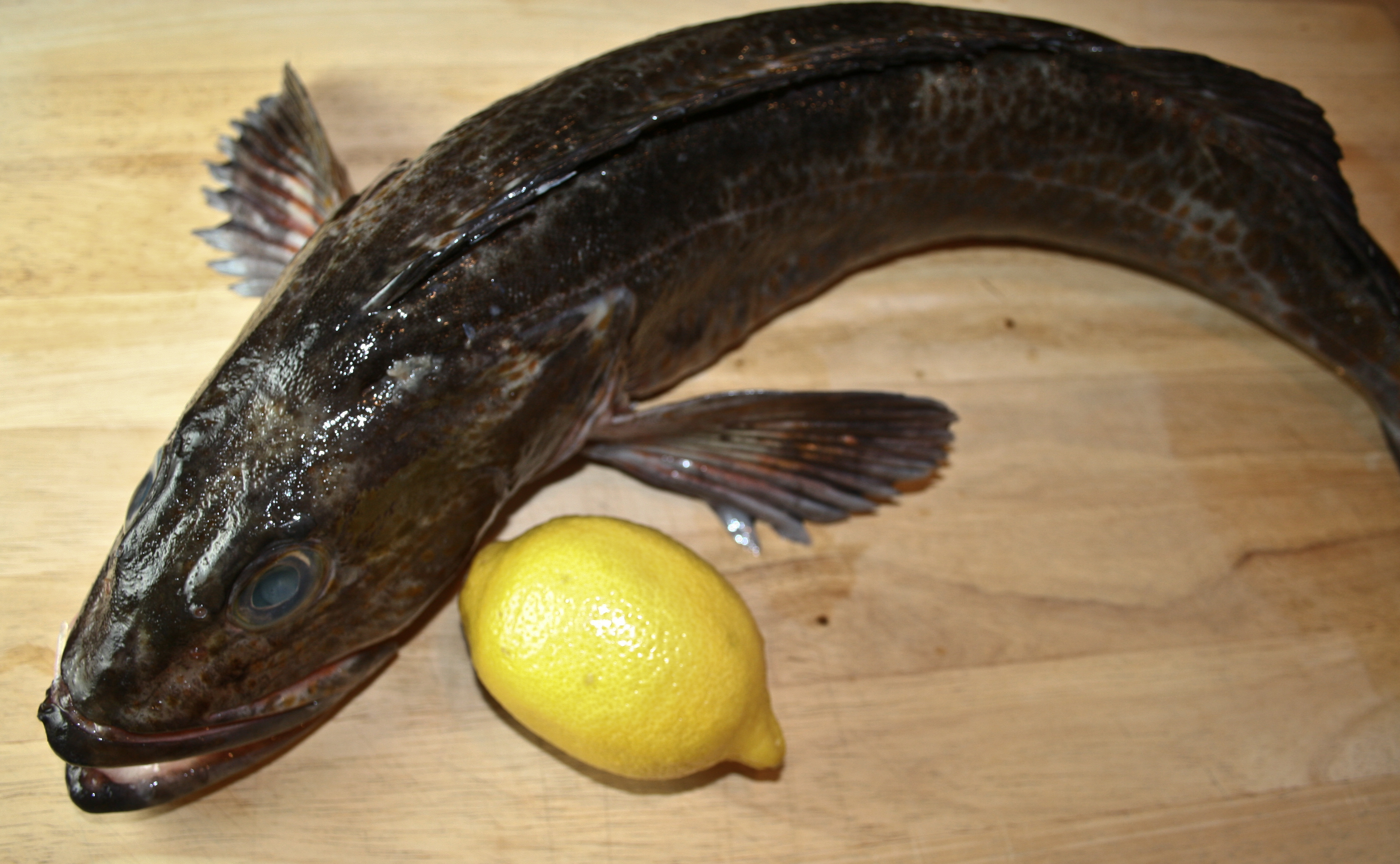
Oregon Lingcod, fresh from the Garibaldi jetty
Lingcods are odd creatures. They’re not related to cod or ling. They’re actually related to greenling…except they’re the big bad boys of the greenling family. If greenlings were like junk-yard dogs, these suckers would be the king of the trash heap.
Usually they’re much farther out in the ocean at rocky bottoms, but it turns out that in the fall and winter, they move closer to shore to mate. I guess it’s harder for a lingcod to find a lover in the deep blue.
By this time it was about midday and I decided to have my sandwich. When I finished, my usual spot had cleared out so I went there and within twenty minutes I caught a ten-inch greenling… Now that’s more “normal,” I thought to myself. I dumped him into my fish bucket and decided that I would call it a day because the tide changed and the fishing usually drops off on outgoing tides.
I called Charles as I was driving home and asked him to look up a recipe that he had cooked once, red snapper à la Veracruzana. I remembered the onions, oregano and olives and the wonderful aroma and was thinking that I would try something similar with the lingcod I was bringing home.
I had visions of roasting the fish whole in the oven but once I got the fish out of the cooler, Charles and I decided that we had no roasting pans big enough to do the job. Plus you just don’t call up four of your best friends at the spur of the moment to come over for dinner because you brought home a sea monster.
I can just imagine the conversation now…
So I donned my neoprene gloves, filleted and skinned the giant, tossed half of him into the freezer and roasted the other half.
Here’s my adaptation of the Veracruzana recipe. At the end of the meal, Mom told me that the fish was very tasty indeed, despite his ugly disposition. She said when she walked into the kitchen and saw the monster on ice earlier in the afternoon, she wasn’t sure she had the stomach to eat the sucker.
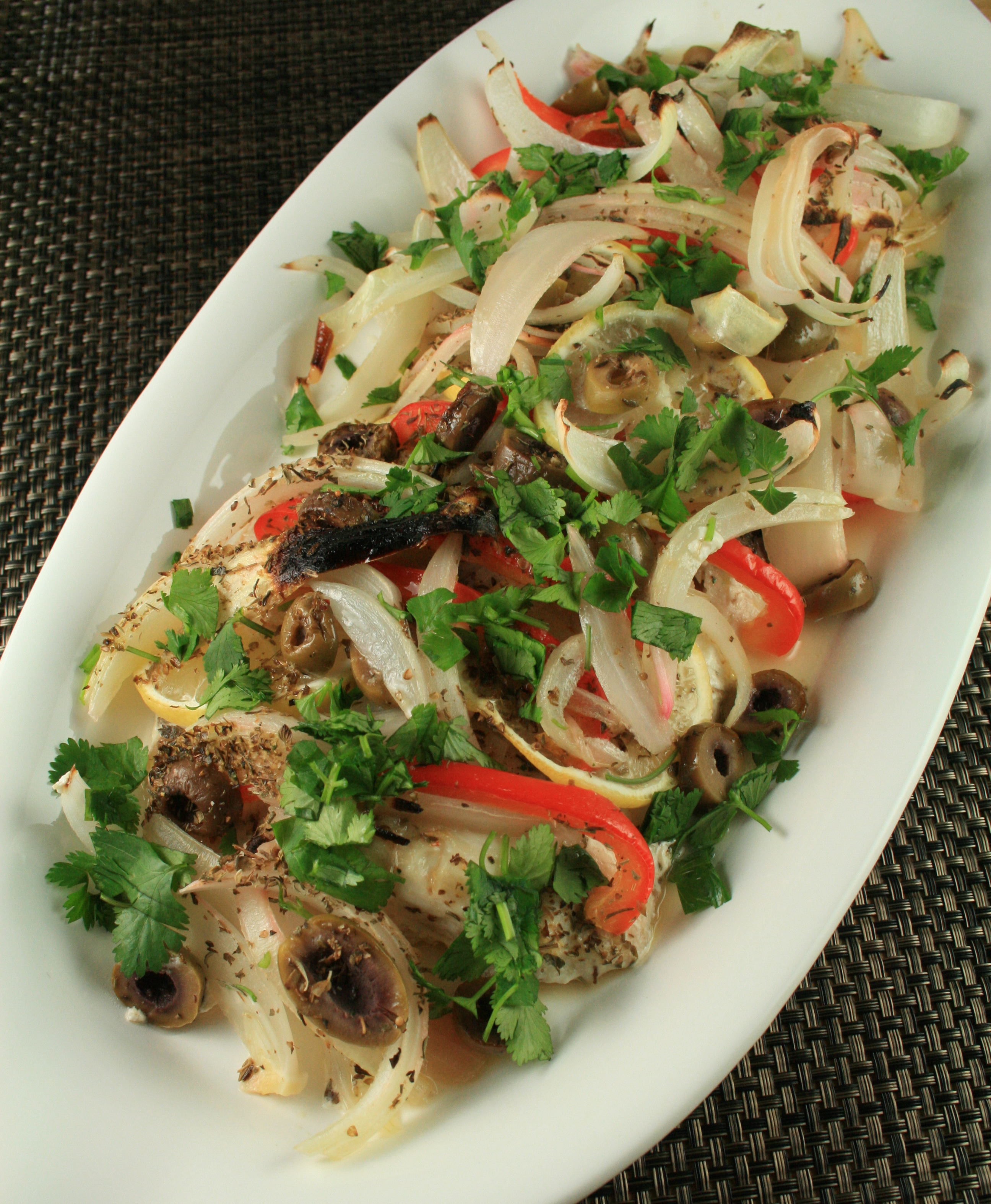
Roasted Lingcod à la Oregonata
Roasted Lingcod à la Oregonata
- 1 whole lemon, sliced
- 1 tablespoon (15 ml.) oregano
- Half of a sweet onion, thinly sliced
- 4 tablespoons (60 ml.) olive oil
- 2 teaspoons (15 ml.) garlic salt
- Half of a red bell pepper, sliced
- 20 green olives, sliced
- A fillet of lingcod
- Ground pepper to taste
- Chopped cilantro for garnish
- Preheat the oven to 350ºF (177ºC).
- In a baking dish, use a brush to spread half of the olive oil to coat the dish.
- Place the fish in the dish and spread the remaining oil on it.
- Season the fish with the garlic salt and ground pepper.
- Cover the fish with the slices of lemon, then spread the sliced onions and bell pepper over the fish until you’ve covered it with the vegetables.
- Sprinkle the chopped green olives evenly over the vegetables and fish.
- Sprinkle the oregano over the vegetables and fish.
- Cover the baking dish with foil and place in the oven for 15 minutes.
- Remove the foil and turn the broiler on high and place the baking dish back into the oven for 5 minutes until the edges of the onions start to burn.
- Remove and place into an oblong serving platter and garnish with cilantro.
I served the fish with Indian-style rice, which is basmati rice and lentils cooked in chicken stock and seasoned with cumin seeds, ginger, turmeric and cinnamon. Click here for an easy recipe from epicurious.com.
Enjoy!
— Vic
About the Author (Author Profile)
Victor Panichkul is a journalist and writer by training; a cook, wine lover and photographer by passion; and a lover of the outdoors since moving to Oregon more than 10 years ago. He is a native of Bangkok, Thailand.


















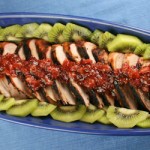

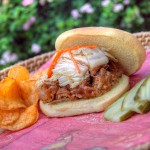



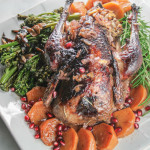

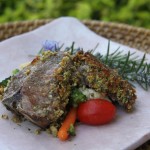
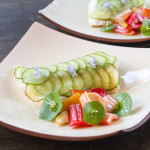
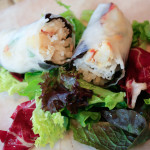





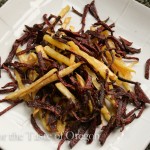


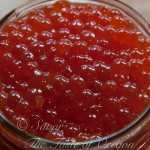


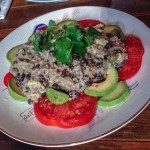

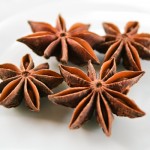






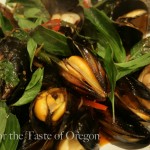






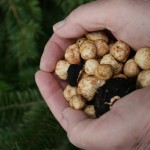




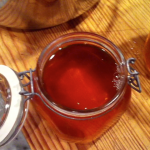











Wish I lived closer so I could come for your delicious dishes. Marlene
Well, maybe one of these days you’ll move here!
Hi, I do think your web site could possibly be having internet browser compatibility issues.
When I look at your site in Safari, it looks fine however, if opening in I.E., it’s got some overlapping issues.
I merely wanted to provide you with a quick heads up!
Besides that, wonderful website!
Thanks for your feedback, our site design doesn’t do well with IE, but Firefox, Google Chrome and Safari are fine.